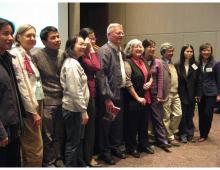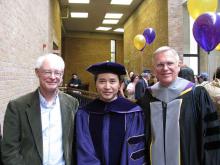By Stevan Harrell, Professor Emeritus
When I arrived at the University of Washington as a brash, green assistant professor in 1974, Charles “Biff” Keyes took me under his wing. He was an associate professor then, already a well-known scholar of Thai society and religion, schooled by years of field research in several regions of the country. His stature and reputation continued to grow for decades after that, and his scholarly output grew to (by rough count) 21 books and innumerable articles and chapters. His awards included the presidency of the Association of Asian Studies in 2001-2002, but another honor, the Marsha Landolt Distinguished Graduate Mentor Award in 2003, even better sums up his legacy.
Biff was major advisor (committee chair) to 45 Ph.D. students, a remarkable total in itself. But more impressive was who they were. He brought at least eight Thai graduate students to the UW, beginning in the late 1960s, and all of them returned to Thailand and other parts of Southeast Asia to become the leaders of a generation of Thai anthropology. But he didn’t stop with Thailand. When the United States and Vietnam began the painful process of reconciliation after the American War there, Biff was one of the first foreign scholars to be invited to visit, and true to form, there were soon Vietnamese graduate students in the halls of Denny, including not only majority Kinh, or Viet scholars, but also representatives of at least three of Vietnam’s ethnic minorities. Like their Thai colleagues and classmates, they returned to teach and do research in universities and institutes all over their country, and with their Thai colleagues they now form a backbone of mainland Southeast Asian anthropology. Many of Biff’s books were co-edited with his students, an indication, together with his contributions to institutions in the US and Asia, of his admirable commitment to scholarship as a group enterprise as well as an individual accomplishment.
Southeast Asian students loved to have a good time between their scholarly travails, and Biff and Jane’s house near the Center for Urban Horticulture was a favorite venue. There always seemed to be an occasion—someone’s birthday, passing exams, a distinguished visitor—for one of their Southeast Asian feasts. Students scurrying around between the kitchen and the buffet on the dining room table; guests in the living room, decorated with artifacts from all over, or in the summertime on the broad deck.
Biff also served ably as chair of this Department from 1985-1990, under the most trying of circumstances. His predecessor for the previous 12 years, the notorious Robert Dunnell, left office with no advice other than a huff, and on Biff’s first day in the literal and metaphorical chair, the two people most responsible for keeping a department going—the departmental administrator and the budget coordinator—quit their jobs. Biff stayed calm (I can’t remember a time when he wasn’t calm, even when privately exasperated) and pulled things back together with a combination of prudence, vision, and good sense. When Carol Eastman succeeded Biff as chair, he was more than willing to give advice and help.
In 1986, while Biff was chair, our indefatigable graduate student Dru Gladney arranged a UW faculty tour of “Nationalities Universities” in Beijing, Kunming, and Chengdu, where Biff would lecture on Anglophone studies of ethnicity and nationality. I was there primarily to be Biff’s interpreter. He happened to arrive in Beijing before I did, and when I arrived at the foreigners’ dormitory at the Central University for Nationalities in Beijing, I found Biff, dressed in a sarong, in one of the spare concrete rooms characteristic of China in the 1980s. He pulled a bottle of Scotch out of his woven shoulder-bag (Karen, perhaps?) and offered me a drink. He wasn’t much of a drinker, but he said it helped him sleep when he was getting over jet lag.
Having spent much of his life in Thailand, Biff liked his food zapped with a few peppers, but at that time foreigner-managers in China were reluctant to serve anything but the blandest food to White people. At one of the first meals, Biff asked for some hot sauce. After that, wherever we went, Biff’s dossier preceded us, and there were plenty of peppers in the dishes or on the side at every meal.
When Biff retired in 2006, there was a huge, two-day celebration in the Walker Ames Room in Kane Hall. James Scott, the great scholar of Asian political economy, gave the keynote, entitled “The Hill People don’t Write, but Professor Keyes Does,” which was both a preview of Scott’s The Art of Not Being Governed and a tribute to Biff’s major contributions to Southeast Asian studies. Even more impressive was the crowd: scholars from Thailand, Vietnam, Japan, China, and Taiwan, as well as from all over North America, some of whom looked upon Biff as a colleague, but more as a mentor. For me he was both.
Biff continued to teach and mentor part-time after his official retirement, and also completed four books. Eventually, he and Jane moved to Portland to be closer to their son Jonathan and his growing family, and I only saw him twice after that. In 2017, we stopped by after watching the total solar eclipse in Corvallis, and although Biff had long been diagnosed with ALS, he seemed fine, fixing tea as Barbara, Jane, and I sat in the garden. But it was not a shock last December when our longtime demographer colleague Charlie Hirschman wrote to say that Biff was declining and would like a call. He was frail, but in the best of spirits, and we talked—gossiped really—for about 20 minutes; my last words to him were probably “Merry Christmas.” On January 3, Biff left us, and he left an unforgettable legacy of students, colleagues, and friends. He is survived by Jane, his wife and collaborator of over half a century, and by sons Nick and Jon and their families.
You can read more about Biff Keyes’s life and work in his memoir, Impermanence: an Anthropologist of Thailand and Asia, published in 2019 by Silkworm Books, Bangkok.

